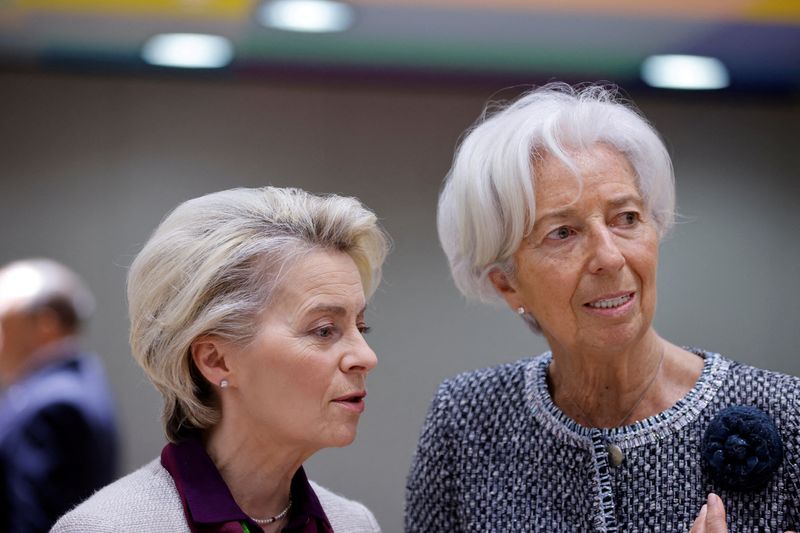By Jan Strupczewski
BRUSSELS (Reuters) – Euro zone governments will try to bolster their public finances next year by withdrawing expensive energy price subsidies but slower economic growth and fear of angering voters are likely to limit fiscal tightening, officials said.
The European Central Bank has called for governments to roll back subsidies introduced to help people cope with the spike in energy prices that followed the start of the Ukraine war, saying doing so will help it stabilise inflation over time.
Withdrawing them is politically sensitive, however, as in the short-term it will push up prices for consumers already struggling with the cost of living.
The 20 countries that share the euro currency have to submit their 2024 budget drafts for European Union inspection by Oct. 15. EU law says budget deficits, if in excess of 3.0% of GDP, must shrink by 0.5% each year until they comply with the limit.
The European Commission has also promised to start disciplinary steps against those with budget gaps above 3.0% next year, which could in theory lead to fines.
But it is already clear that some countries, like France or Italy, will remain well above the 3% ceiling next year and that the scope of fiscal tightening, while in line with the minimum requirement, will be smaller than it could be.
France expects its fiscal shortfall to fall from 4.9% of GDP this year to 4.4% in 2024, before only gradually dropping to 2.7% in 2027. Paris will raise welfare and pension payouts next year to help households fight inflation that is still way above the ECB’s 2% target.
The French fiscal watchdog has said these plans are built on optimistic assumptions and lack ambition.
Italy plans to raise its 2024 budget deficit target to between 4.1% and 4.3% of GDP from the 3.7% goal set in April, and revise upwards its deficit this year to 5.5% from 4.5%, sources told Reuters on Monday.
This is partly because Prime Minister Giorgia Meloni wants to extend to 2024 tax cuts that have helped middle and low-income workers cope with high consumer prices this year, even though euro zone ministers agreed in July to end them. Markets have already reacted by raising Italy’s risk premium.
Germany, while planning to cut the deficit to 2.0% next year from 2.5%, is still considering how long to keep energy subsidies for industry and whether a new scheme is needed.
INFLATION FIGHT
EU rules aside, the 2024 fiscal tightening is also crucial for the ECB, which after a streak of interest rate rises since mid-2022 may be reaching the limits of fighting high inflation without strangling the economy.
The euro zone’s central bank has been calling on governments to help curb price growth that is still more than 5%. While euro zone finance ministers agree, the ECB’s inflation problems are not always their top priority.
“I don’t think anyone has the ECB in mind when they decide on their budgets,” one senior euro zone official said. “Some are having elections, others feel the economic contraction – preliminary data shows that the economy has been worse than previously thought.”
Belgium, Austria, Lithuania, Croatia all have elections next year, making their governments wary of slashing spending.
Spain, where parties are still trying to form a government after inconclusive July elections, may extend some of the measures introduced to alleviate the impact of inflation or even implement new ones, by the end of the year.
Slower economic growth does not help. The Commission has cut its euro zone growth forecast to 0.8% in 2023 from 1.1% and to 1.3% in 2024 from 1.6%. The ECB is even more pessimistic, with a GDP forecast of 0.7% for 2023 and 1.0% for 2024.
“One issue that may change fiscal planning somewhat is the worsening economic outlook,” a second senior euro zone official said.
The ECB, which is monitoring more than 500 temporary fiscal measures introduced by euro zone governments mainly to reduce energy costs for households, says most countries are complying with the July agreement to end subsidies.
“We are saying to member states: roll back, remove those programmes, those subsidies, those shields, those grants that you had put in place. And by a large account, members states are actually doing that,” ECB President Christine Lagarde told the European Parliament on Monday.
Paradoxically, the removal of the subsidies will boost prices for consumers in 2024, keeping inflation at 3.2% according to the ECB, rather than 2.9% as forecast by the Commission. But in the longer-term, this will help prices stabilise, the ECB says.
(Additional reporting by Balazs Koranyi in Frankfurt, Maria Martinez in Berlin, Leigh Thomas in Paris, Belen Carreno in Madrid, Gavin Jones and Giuseppe Fonte in Rome; Editing by Catherine Evans)
